The Intel Kaby Lake-X i7 7740X and i5 7640X Review: The New Single-Threaded Champion, OC to 5GHz
by Ian Cutress on July 24, 2017 8:30 AM EST- Posted in
- CPUs
- Intel
- Kaby Lake
- X299
- Basin Falls
- Kaby Lake-X
- i7-7740X
- i5-7640X
Benchmarking Performance: CPU Legacy Tests
Our legacy tests represent benchmarks that were once at the height of their time. Some of these are industry standard synthetics, and we have data going back over 10 years. All of the data here has been rerun on Windows 10, and we plan to go back several generations of components to see how performance has evolved.
All of our benchmark results can also be found in our benchmark engine, Bench.
3D Particle Movement v1
3DPM is a self-penned benchmark, taking basic 3D movement algorithms used in Brownian Motion simulations and testing them for speed. High floating point performance, MHz and IPC wins in the single thread version, whereas the multithread version has to handle the threads and loves more cores. This is the original version, written in the style of a typical non-computer science student coding up an algorithm for their theoretical problem, and comes without any non-obvious optimizations not already performed by the compiler, such as false sharing.
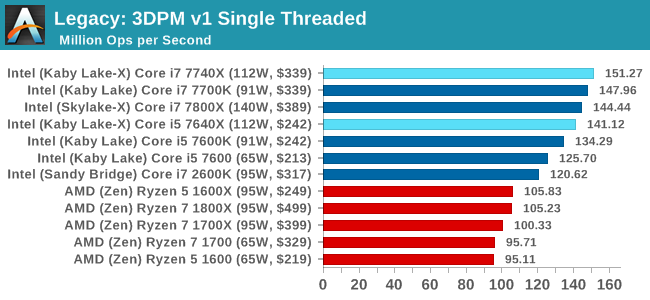
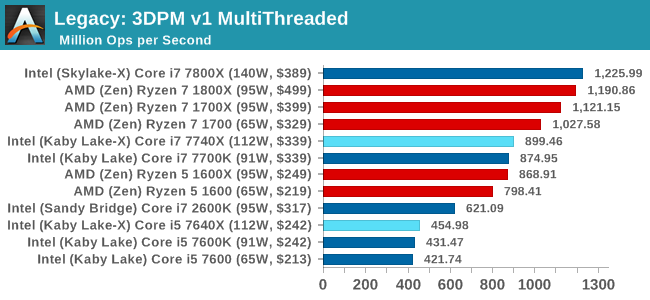
CineBench 11.5 and 10
Cinebench is a widely known benchmarking tool for measuring performance relative to MAXON's animation software Cinema 4D. Cinebench has been optimized over a decade and focuses on purely CPU horsepower, meaning if there is a discrepancy in pure throughput characteristics, Cinebench is likely to show that discrepancy. Arguably other software doesn't make use of all the tools available, so the real world relevance might purely be academic, but given our large database of data for Cinebench it seems difficult to ignore a small five-minute test. We run the modern version 15 in this test, as well as the older 11.5 and 10 due to our back data.
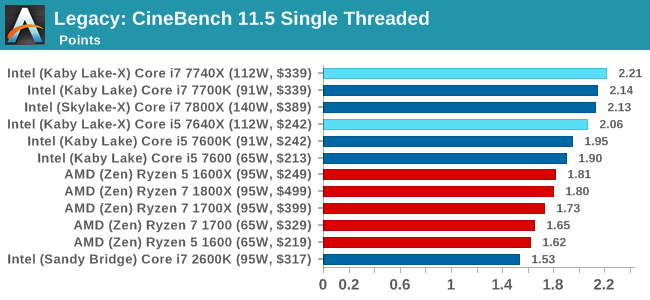
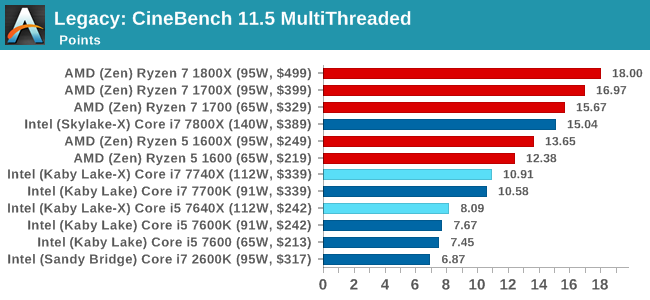
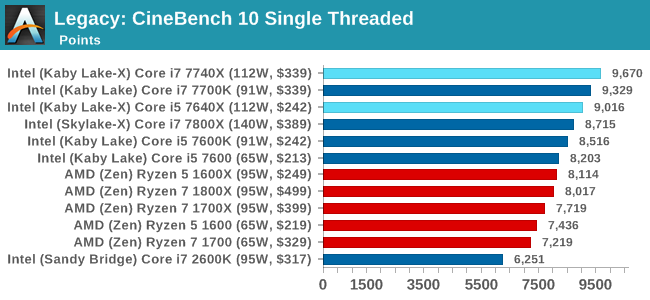

x264 HD 3.0
Similarly, the x264 HD 3.0 package we use here is also kept for historic regressional data. The latest version is 5.0.1, and encodes a 1080p video clip into a high-quality x264 file. Version 3.0 only performs the same test on a 720p file, and in most circumstances the software performance hits its limit on high-end processors, but still works well for mainstream and low-end. Also, this version only takes a few minutes, whereas the latest can take over 90 minutes to run.
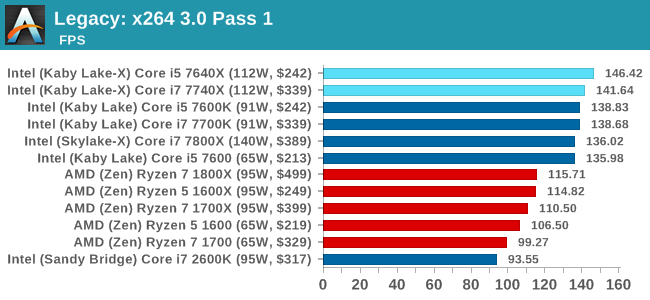
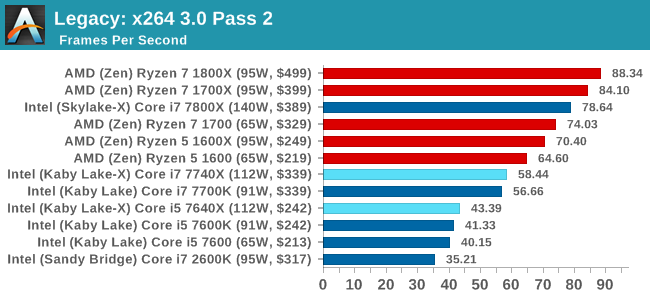










176 Comments
View All Comments
MTEK - Monday, July 24, 2017 - link
Random amusement: Sandy Bridge got 1st place in the Shadow of Mordor bench w/ a GTX 1060.shabby - Monday, July 24, 2017 - link
That's funny and sad at the same time unfortunately.mapesdhs - Monday, July 24, 2017 - link
S'why I love my 5GHz 2700K (daily system). And the other one (gaming PC). And the third (benchmarking rig), the two I've sold to companies, another built for a friend, another set aside to sell, another on a shelf awaiting setup... :D 5GHz every time. M4E, TRUE, one fan, 5 mins, done.GeorgeH - Monday, July 24, 2017 - link
Those decreased overclocking performance numbers aren't just red flags, they're blinding red flashing lights with the power of a thousand suns.Seriously, that should have been the entire article - this platform is a disaster if it loses performance under sustained load. That's not hyperbole, it's cold hard truth. Sustained load is part of what HEDT is about, and with X299 you're spending more money for significantly less performance?
I sincerely hope you're going to get to the bottom of this and not just shrug and let it slide away as a mystery. Hopefully it's just platform immaturity that gets ironed out, but at the present time I have absolutely no clue how you could recommend X299 in any way. Significantly less sustained performance is a do not pass go, do not collect $200, turn the car around, oh hell no, all caps showstopper.
deathBOB - Monday, July 24, 2017 - link
But they're big AVX workloads. We know heat and power get a bit crazy with the AVX, and at some point we should just step back and realize that overclocking may not be appropriate for these workloads.GeorgeH - Monday, July 24, 2017 - link
But other AVX workloads didn't have the issue.Until we know exactly what is going on and what will be required to fix it, I can't comprehend how anyone can regard X299, at least with the quad core CPUs, as anything but "Nope". Maybe a BIOS update will help, or tuning the overclock, but maybe it'll require new motherboard revisions or delidding the CPU. I'm sure it'll get fixed/understood at some point, but for now recommending this platform is really hard to accept as a good idea.
MrSpadge - Monday, July 24, 2017 - link
> But other AVX workloads didn't have the issue.Using a few of those instructions is different from hammering the CPU with them. Not sure what this software does, but this could easily explain it.
Icehawk - Monday, July 24, 2017 - link
I do a lot of Handbrake encoding to HEVC which will peg all cores on my O/C'd 3770, it uses AVX but obviously a much older version with less functionality, and I can have it going indefinitely without issue.I've looked at the 7800\7820 as an upgrade but if they cannot sustain performance with a reasonable cooling setup then there is no point. The KBL-X parts don't offer enough of a performance improvement to be worth the cost of the X299 mobo which also seem to be having teething problems.
Future proofing is laughable, let's say you bought a 7740x today with the thought of upgrading in two years to a higher core count proc - how likely is it that your motherboard and the new proc will have the same pinout? History says it ain't happening at Camp Intel.
At this point I'm giving a hard pass to this generation of Intel products and hope that v2 will fix these issues. By then AMD may have come close enough in ST performance where I would consider them again, I really want the best ST & MT performance I can get in the $350 CPU zone which has traditionally been the top i7. AMD's MT performance almost tempts me to just build an encoding box.
I loved my Athlon back in the day, anyone remember Golden Fingers? :D
mapesdhs - Monday, July 24, 2017 - link
Golden Fingers... I had to look that up, blimey! :DDrKlahn - Tuesday, July 25, 2017 - link
I recently went from a 4.6GHz 3770K to a 1700X @ 4GHz at home. I play some older games that don't thread well (WoW being one of them). The Ryzen is at least as fast or faster in those workloads. Run Handbrake or Sony Movie Studio and the Ryzen is MUCH faster. We use built 6 core 5820K stations at work for some users and have recently added Ryzen 1600 stations due to the tremendous cost savings. We have yet to run into any tangible difference between the two platforms.Intel does have a lead in ST, but tests like these emphasize it to the point it seems like a bigger advantage than it is in reality. The only time I could see the premium worth it is if you have a task that needs ST the majority of the time (or a program is simply very poorly optimized for Ryzen). Otherwise AMD is offering an extraordinary value and as you point out AM4 will at least be supported for 2 more spins.